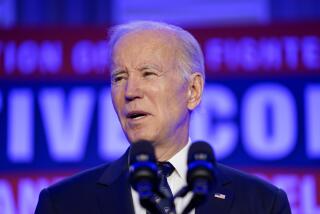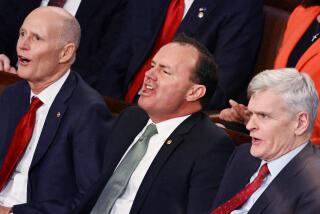Clinton Comes to Defense of Medicare Means Testing
- Share via
WASHINGTON — Responding to Republican complaints that he has failed to assert the leadership needed to shore up Medicare, President Clinton on Tuesday strongly endorsed efforts to charge affluent senior citizens more for their medical benefits, promising to defend any lawmaker who voted for the approach.
Clinton’s unexpected remarks came just one day after a proposal to add a wealth test for Medicare appeared to collapse--and seemed to breathe a flicker of life into the plan, which has been a touchy issue in House-Senate budget talks.
“My best judgment is that a big majority of the American people will support this,” Clinton said of plans to impose a means test for well-off Medicare beneficiaries. The Senate’s means-testing proposal would kick in at annual income levels of $50,000; Clinton did not specify an income level.
In an exchange with reporters, Clinton added: “I would be happy to defend the vote of any member of Congress, Democrat or Republican, who votes for this.”
Meanwhile, in other budget-related developments, House and Senate Republicans reached agreement Tuesday on a new tax-cut proposal to be presented to the Clinton administration in a meeting today. The proposal will serve as the basis for further talks with the White House on how to apportion the $85 billion in tax cuts called for in the five-year balanced-budget accord reached this spring by White House and congressional leaders.
Although final details of the new GOP plan remain to be worked out, sources close to the talks indicated that House Republicans agreed “in principle” to include an increase in the tax on cigarettes--but only if additional revenue is needed to meet the budget agreement’s tax targets. The Senate version of the tax bill included a 20-cents-per-pack increase in cigarette taxes; the House bill included none.
Sen. Don Nickles (R-Okla.) said GOP negotiators also agreed to include a scaled-back version of a House proposal--vigorously opposed by the White House--that would exempt from taxation capital gains attributable only to inflation.
On the Medicare issue, however, agreement remained far from certain.
The White House approach, which would use the Treasury Department to process the higher payments, was immediately attacked by some Republicans as a backdoor tax hike. Moreover, Clinton’s comments triggered a guessing game on Capitol Hill as to whether the White House truly supported the plan or had seized on an elaborate way to sabotage it.
“Was it intended as a poison pill?” asked Sen. Phil Gramm (R-Texas). “I don’t know.” Clinton, he said, has “got to divorce this from April 15, taxes and the” Internal Revenue Service.
Under the administration plan, the Treasury Department, parent of the Internal Revenue Service, would mail a “Medicare premium adjustment form” to senior citizens each year. The form would tell seniors how to compute their income, and those owing money would be instructed to write a check to the “Medicare Trust Fund” and send it to the Treasury Department by April 15.
Senate Republicans, averse to any hint of a tax increase, had suggested having the Department of Health and Human Services handle the payments.
But White House officials said it would be cheaper to use the Treasury than to create a new, mini-IRS inside HHS. Relying on the Treasury Department would save $5 billion over five years, and $12 billion over 10 years, the administration said Tuesday.
Tuesday’s development was just the latest in a long and acrimonious saga over funding Medicare, which faces growing financial pressure in the coming years. Earlier this week, House and Senate negotiators abandoned the Senate’s means-testing proposal. House members feared Democrats would exploit the issue in future elections, and Republicans were less than assured by Clinton’s seemingly lukewarm support for the plan.
But on Tuesday, the president stepped up his rhetoric in favor of a means test, and he predicted it was far less perilous politically than many fear. While it is little remembered, Clinton’s 1993 health care reform plan included a means test for Medicare, starting at annual incomes of $90,000.
“A big majority of the American people will support this,” Clinton said Tuesday. “They understand how big the baby-boom retirement generation is.”
On Capitol Hill, however, the immediate response was wary.
“On the surface it looks like a good-faith effort, but we’ll have to carefully look at it,” said Senate Budget Committee Chairman Pete V. Domenici (R-N.M.).
Sen. Connie Mack (R-Fla.), who has been a vocal champion of long-term Medicare reforms, was more negative.
“Frankly I don’t think there really was anything particularly new,” he said. Mack also was far from satisfied by Clinton’s vow to “defend” those who vote for means testing.
“At this point it’s probably a fairer thing to ask the House guys [Democrats] whether they feel comfortable” making a similar pledge, Mack said.
“Where’s [Vice President Al] Gore? Where’s [House Democratic leader Richard A.] Gephardt? Where’s the Democratic National Committee? Are they going to demagogue the Medicare issue again the same way they did in the last election?”
Times staff writer Edwin Chen contributed to this story.
More to Read
Get the L.A. Times Politics newsletter
Deeply reported insights into legislation, politics and policy from Sacramento, Washington and beyond. In your inbox twice per week.
You may occasionally receive promotional content from the Los Angeles Times.











